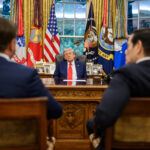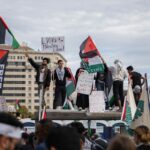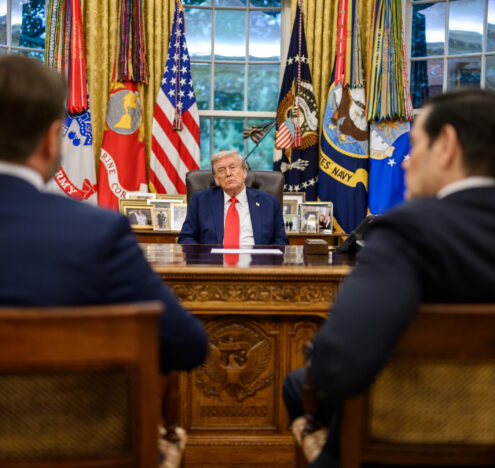In light of the Biden administration’s latest decision to sell $650 million in air-to-air missiles to Saudi Arabia, it’s time to disentangle Saudi-US relations, particularly when it comes to the war in Yemen. This latest sale will enable Saudi Arabia to intercept unmanned drones from Yemen, which have been used to target Saudi military sites and oil infrastructure. Disentanglement doesn’t mean cutting off ties, but it does mean Washington should stop handing out matches to an arsonist.
Since the Obama administration, the US has been providing the bombs that strike Yemeni schoolchildren, has been servicing the planes which drop these bombs, and has been providing the missile defenses that protect Saudi military sites. The result is the world’s largest humanitarian crisis — 20 million Yemenis reliant on aid, among which are 2 million starving children. Saudi Arabia’s campaign focuses on the Houthi movement, not al Qaida in the Arabian Peninsula, meaning that the US doesn’t even see any security benefits as a result.
Acknowledging the moral and strategic blunders in supporting Saudi Arabia’s war in Yemen, President Joe Biden announced in April that the US would end support to offensive operations. Yet, much like the announced “end” of combat operations in Iraq, this hasn’t translated to actual changes on the ground. The US is still servicing Saudi warplanes via contractors. And in September, the State Department approved a $500 million deal to service Saudi helicopters. As a reminder, Saudi air capabilities have been a key factor in worsening Yemen’s crisis.
In September, legislative pathways emerged to do via Congress what hasn’t been done by the White House. Two House amendments to this year’s National Defense Authorization Act (NDAA) have provisions that require the US to suspend logistical support to Saudi offensive operations, though the differences are worth noting.
Representative Gregory Weldon Meek’s (D-NY) amendment has an explicit exception allowing the US to support Saudi operations for “preventing or degrading the ability of Houthi (Ansar Allah) forces to launch missiles and unmanned aircraft strikes.” In effect, this provides a wide berth for activities that continue the war and goes beyond enabling strikes on al Qaida. Representative Ro Khanna’s (D-CA) amendment, by contrast, would end all logistical support to anti-Houthi strikes while permitting operations against al-Qaeda. The Senate version of the NDAA will likely decide which of these amendments make it into law. The current Senate version aligns closer to the Meeks amendment than to Khanna’s, restricting “offensive operations” but allowing support to combat “ballistic missile, cruise missile, unmanned aerial vehicle, or explosive boat threats.”
Disentanglement doesn’t mean isolation. It means not letting the arsonist pull us into the fire.
A prudent policy is to actually restrict the logistical support that the Saudis use to conduct their devastating war. Given that the Meeks amendment would leave most of this support in place, the Khanna amendment is better for disentangling the US from the Saudi-led war. Saudi Arabia uses American weapons and lacks the personnel to maintain these weapons without US assistance. Consequently, restricting this support, as the Khanna amendment would do, would force the Saudis to terminate their offensive war in Yemen. The executive branch also shouldn’t drag its feet until it’s forced by Congress to do otherwise.
Policy should match rhetoric, and ending support should entail more than just obfuscating that support via contractors. These private contractors operate under the Department of Defense, servicing equipment and providing technical support in lieu of the US government itself. Using these contractors in place of actual Defense Department personnel allows the US to plausibly state that it has withdrawn logistical and technical support, while the support substantively continues.
There’s also good indication that disentangling from Saudi Arabia’s war would actually do more to achieve regional stability. After seeing signs that Biden wouldn’t offer them the same blanket support, Saudi Arabia began talks with Iran, its main regional rival. Likewise, in dealing with the Houthis, the Saudis have resorted to negotiation rather than bombs.
The US doesn’t have to disengage just because it’s not militarily committed, either. This is a false paradigm. The US can act as a broker for negotiations, as when it reached out to the Houthi leadership earlier this year. Doing so would fulfill Biden’s aim of putting diplomacy first. The US, however, should act as a mediator rather than a negotiator. For any regional talks to work, they have to actually address the stakes and resolve of powers in the region. Injecting US pressure artificially would undermine the stability of that deal.
Washington has become aware that its interests don’t align with Saudi Arabia’s. The key question is how to proceed from here. The US has to finish disengaging militarily. This means the executive branch stops logistical support for Saudi military operations. Failing that, Congress has the power to restrict it by legislation. Disentanglement doesn’t mean isolation. It means not letting the arsonist pull us into the fire.
Geoff LaMear is a Fellow at Defense Priorities.




















